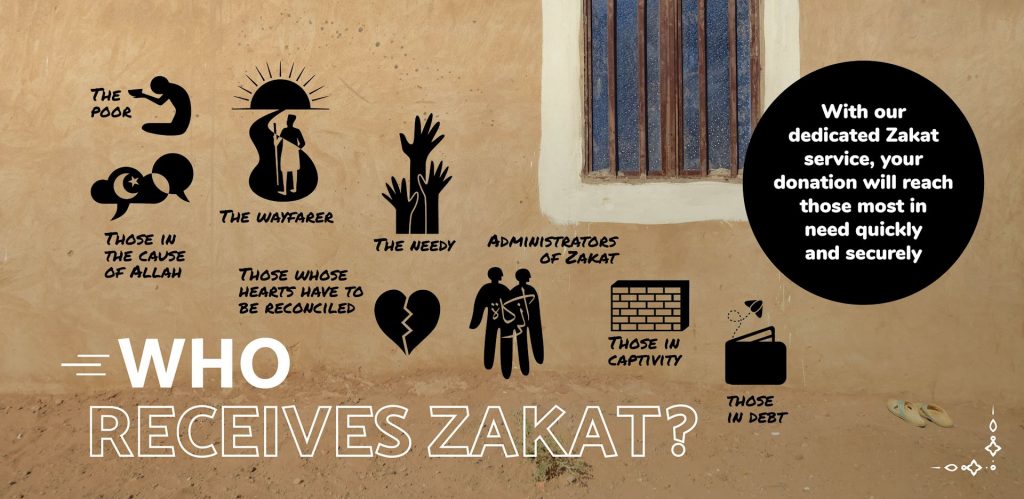Zakaat
Zakaat
Zakat is one of the five pillars of Islam, and is an obligatory charity that all adult and sane Muslims who possess a minimum amount of wealth (nisaab) are required to pay each year. It is a form of purification of wealth and an act of worship in Islam, and is intended to help the needy and less fortunate members of society.
The amount of Zakat to be paid is 2.5% of one’s wealth that has been held for a lunar year, which includes cash, gold, silver, and other assets. The money collected from Zakat is distributed to those in need, including the poor, the needy, orphans, widows, and the disabled. It can also be used for the propagation of Islam and the education of Muslims.
Zakat is considered to be a fundamental aspect of Islamic social justice and economic fairness, as it aims to create a balance between the rich and the poor, and to ensure that wealth is distributed in a fair and equitable manner. It is also believed to have numerous spiritual and moral benefits, such as purifying one’s wealth, promoting humility and generosity, and increasing one’s faith and connection to Allah.
In summary, Zakat is an obligatory form of charity in Islam that requires Muslims to give a portion of their wealth to help those in need, and is considered to be an essential aspect of Islamic social justice and economic fairness.
Importance of Zakat in Islam
Zakat is of great importance in Islam, as it is one of the five pillars of Islam and is considered to be an essential aspect of the faith. Here are some of the reasons why Zakat is so important in Islam:
- Obligatory Act of Worship: Zakat is an obligatory act of worship for all Muslims who meet the criteria for payment. It is a fundamental duty that Muslims are required to fulfill, and failing to pay Zakat is considered a major sin.
- Purification of Wealth: Zakat is a means of purifying one’s wealth, as it is intended to remove greed and attachment to material possessions, and to promote generosity and humility.
- Social Justice: Zakat is considered to be an important aspect of Islamic social justice, as it aims to create a balance between the rich and the poor, and to ensure that wealth is distributed in a fair and equitable manner.
- Assistance to the Needy: Zakat is primarily intended to help the needy and less fortunate members of society, including the poor, the needy, orphans, widows, and the disabled. It is a means of providing assistance to those who are in need of financial support.
- Blessings and Rewards: Giving Zakat is believed to have numerous blessings and rewards, both in this life and in the Hereafter. It is considered to be a means of earning Allah’s forgiveness and blessings, and is believed to increase one’s faith and connection to Allah.
Overall, Zakat is an essential aspect of Islam that promotes social justice, generosity, and compassion for those in need. It is a means of purifying wealth, fulfilling an obligation to Allah, and earning blessings and rewards both in this life and in the Hereafter.
How to Calculate Zakat
Calculating Zakat can be done in several steps. Here is a general guideline on how to calculate Zakat:
- Determine the Nisab: The Nisab is the minimum amount of wealth that a person must have before they are obligated to pay Zakat. The Nisab is calculated based on the current market value of 3 ounces of gold or 21 ounces of silver.
- Add up Total Assets: Calculate the total value of all assets that you have, including cash, gold, silver, and other assets that are held for investment or business purposes.
- Subtract Debts and Expenses: Subtract any debts that you owe and any necessary expenses from your total assets.
- Calculate the Zakat Due: Calculate 2.5% of the remaining total assets. This amount is the Zakat due for that year.
- Here is an example to illustrate how to calculate Zakat:
Assume that a person has the following assets and debts:
- Cash: $5,000
- Gold: 5 ounces (valued at $7,500)
- Silver: 50 ounces (valued at $1,500)
- Debts: $1,000
To calculate Zakat for this person:
- Determine the Nisab: Based on the current market value of 3 ounces of gold, the Nisab is $4,500.
- Add up Total Assets: The total assets of this person are:
- Cash: $5,000
- Gold: $7,500
- Silver: $1,500
- Total Assets: $14,000
- Subtract Debts and Expenses: Subtract the debts of $1,000 from the total assets of $14,000:
- Total Assets – Debts = $13,000
- Calculate the Zakat Due: Calculate 2.5% of $13,000:
- Zakat Due = $13,000 x 2.5% = $325
- Therefore, in this example, the Zakat due for the year is $325.
- It is important to note that there are different rules and considerations that may apply when calculating Zakat for specific types of assets, such as business or investment assets, and it is recommended to seek guidance from a knowledgeable Islamic scholar or accountant when calculating Zakat.

